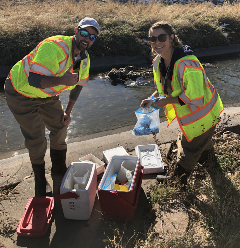South Platte Renew Watershed Collaboration Creates an Impact on Water Quality
 South Platte Renew (SPR) is a resource recovery facility that serves approximately 300,000 customers in the South Denver region and treats an average of 18 million gallons per day. Treated water is returned to the South Platte River which runs north through metropolitan Denver. SPR understands the importance of building partnerships across the watershed for the benefit of the river and its many stakeholders. SPR staff serve in leadership positions in several organizations that drive collaborative efforts toward improving water quality, including the South Platte Coalition for Urban River Evaluation (SPCURE) and the Barr Lake and Milton Reservoir Watershed Association (BMW). SPCURE uses sound science to resolve water quality issues on a watershed basis, while BMW improves water quality within Barr Lake and Milton Reservoir, both of which are impaired for dissolved oxygen and pH due to excess nutrients.
South Platte Renew (SPR) is a resource recovery facility that serves approximately 300,000 customers in the South Denver region and treats an average of 18 million gallons per day. Treated water is returned to the South Platte River which runs north through metropolitan Denver. SPR understands the importance of building partnerships across the watershed for the benefit of the river and its many stakeholders. SPR staff serve in leadership positions in several organizations that drive collaborative efforts toward improving water quality, including the South Platte Coalition for Urban River Evaluation (SPCURE) and the Barr Lake and Milton Reservoir Watershed Association (BMW). SPCURE uses sound science to resolve water quality issues on a watershed basis, while BMW improves water quality within Barr Lake and Milton Reservoir, both of which are impaired for dissolved oxygen and pH due to excess nutrients.
As a result of the federal Lead and Copper Rule, developed by US EPA pursuant to the Safe Drinking Water Act, the state’s largest drinking water provider, Denver Water, was required to undertake action to control the corrosion of lead pipes within its network. Colorado’s regulatory agency determined that the addition of orthophosphate into treated drinking water was the optimal treatment strategy to lower lead concentrations. To understand what the water quality effects of orthophosphate addition might be, SPCURE coordinated sampling efforts to collect and analyze orthophosphate data in surface water. BMW utilized data to understand what effects the decision may have on Barr Lake and Milton Reservoir. SPR staff were integral in leading BMW through various legal and stakeholder efforts that were necessary to ensure that a major source of phosphorus would not be added if other alternatives for lead removal could be proven equally effective.
Guided by the findings of their work, SPCURE and BMW supported a variance to allow Denver Water to utilize a different corrosion control strategy. That variance was granted and instead of dosing orthophosphate, the utility will implement its Lead Reduction Program that will reduce lead concentrations by replacing all lead service lines within 15 years and by implementing a new treatment strategy which will have negligible impacts on water quality. Without the collaborative effort from SPCURE, BMW, and other organizations, the variance may not have been successful and would have resulted in phosphorus additions in a watershed that already experiences adverse effects from elevated nutrients.
NACWA awarded South Platte Renew a 2021 National Environmental Achievement Award in the Watershed Collaboration category for its effective cooperative efforts. Congratulations to SPR and everyone involved!